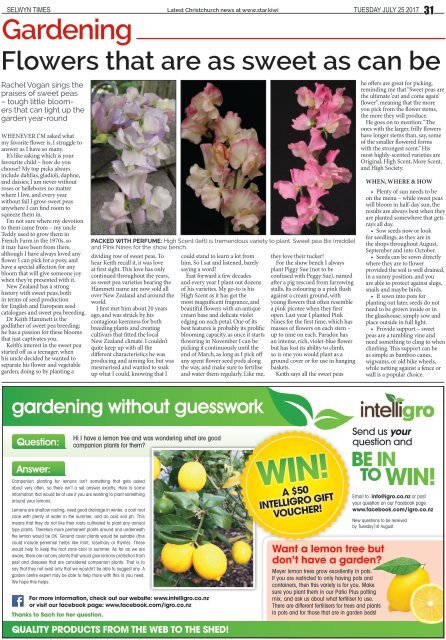You also want an ePaper? Increase the reach of your titles
YUMPU automatically turns print PDFs into web optimized ePapers that Google loves.
SELWYN TIMES Latest Christchurch news at www.star.kiwi<br />
Tuesday <strong>July</strong> <strong>25</strong> <strong>2017</strong> 31<br />
Gardening<br />
Flowers that are as sweet as can be<br />
Rachel Vogan sings the<br />
praises of sweet peas<br />
– tough little bloomers<br />
that can light up the<br />
garden year-round<br />
WHENEVER I’M asked what<br />
my favorite flower is, I struggle to<br />
answer as I have so many.<br />
It’s like asking which is your<br />
favourite child – how do you<br />
choose? My top picks always<br />
include dahlias, gladioli, daphne,<br />
and daisies; I am never without<br />
roses or hellebores no matter<br />
where I live, and every year<br />
without fail I grow sweet peas<br />
anywhere I can find room to<br />
squeeze them in.<br />
I’m not sure where my devotion<br />
to them came from – my uncle<br />
Teddy used to grow them in<br />
French Farm in the 1970s, so<br />
it may have been from there,<br />
although I have always loved any<br />
flower I can pick for a posy, and<br />
have a special affection for any<br />
bloom that will give someone joy<br />
when they’re presented with it.<br />
New Zealand has a strong<br />
history with sweet peas, both<br />
in terms of seed production<br />
for English and European seed<br />
catalogues and sweet pea breeding.<br />
Dr Keith Hammett is the<br />
godfather of sweet pea breeding;<br />
he has a passion for these blooms<br />
that just captivates you.<br />
Keith’s interest in the sweet pea<br />
started off as a teenager, when<br />
his uncle decided he wanted to<br />
separate his flower and vegetable<br />
garden, doing so by planting a<br />
PACKED WITH PERFUME: High Scent (left) is tremendous variety to plant. Sweet pea Bix (middle)<br />
and Pink Nines for the show bench.<br />
dividing row of sweet peas. To<br />
hear Keith recall it, it was love<br />
at first sight. This love has only<br />
continued throughout the years,<br />
as sweet pea varieties bearing the<br />
Hammett name are now sold all<br />
over New Zealand and around the<br />
world.<br />
I first met him about 20 years<br />
ago, and was struck by his<br />
contagious keenness for both<br />
breeding plants and creating<br />
cultivars that fitted the local<br />
New Zealand climate. I couldn’t<br />
quite keep up with all the<br />
different characteristics he was<br />
producing and aiming for, but was<br />
mesmerised and wanted to soak<br />
up what I could, knowing that I<br />
could stand to learn a lot from<br />
him. So I sat and listened, barely<br />
saying a word!<br />
Fast forward a few decades<br />
and every year I plant out dozens<br />
of his varieties. My go-to is his<br />
High Scent as it has got the<br />
most magnificent fragrance, and<br />
beautiful flowers with an antique<br />
cream base and delicate violet<br />
edging on each petal. One of its<br />
best features is probably its prolific<br />
blooming capacity, as once it starts<br />
flowering in November I can be<br />
picking it continuously until the<br />
end of March, as long as I pick off<br />
any spent flower seed pods along<br />
the way, and make sure to fertilise<br />
and water them regularly. Like me,<br />
they love their tucker!<br />
For the show bench I always<br />
plant Piggy Sue (not to be<br />
confused with Peggy Sue), named<br />
after a pig rescued from farrowing<br />
stalls. Its colouring is a pink flush<br />
against a cream ground, with<br />
young flowers that often resemble<br />
a pink picotee when they first<br />
open. Last year I planted Pink<br />
Nines for the first time, which has<br />
masses of flowers on each stem –<br />
up to nine on each. Paradox has<br />
an intense, rich, violet-blue flower<br />
but has lost its ability to climb,<br />
so is one you would plant as a<br />
ground cover or for use in hanging<br />
baskets.<br />
Keith says all the sweet peas<br />
he offers are great for picking,<br />
reminding me that “Sweet peas are<br />
the ultimate ‘cut and come again’<br />
flower”, meaning that the more<br />
you pick from the flower stems,<br />
the more they will produce.<br />
He goes on to mention: “The<br />
ones with the larger, frilly flowers<br />
have longer stems than, say, some<br />
of the smaller flowered forms<br />
with the strongest scent.” His<br />
most highly-scented varieties are<br />
Original, High Scent, More Scent,<br />
and High Society.<br />
WHEN, WHERE & HOW<br />
• Plenty of sun needs to be<br />
on the menu – while sweet peas<br />
will bloom in half-day sun, the<br />
results are always best when they<br />
are planted somewhere that gets<br />
rays all day.<br />
• Sow seeds now or look<br />
for seedlings, as they are in<br />
the shops throughout August,<br />
September and into October.<br />
• Seeds can be sown directly<br />
where they are to flower<br />
provided the soil is well drained,<br />
in a sunny position, and you<br />
are able to protect against slugs,<br />
snails and maybe birds.<br />
• If sown into pots for<br />
planting out later, seeds do not<br />
need to be grown inside or in<br />
the glasshouse, simply sow and<br />
place outside in full light.<br />
• Provide support – sweet<br />
peas are a tumbling vine and<br />
need something to cling to when<br />
climbing. This support can be<br />
as simple as bamboo canes,<br />
wigwams, or old bike wheels,<br />
while netting against a fence or<br />
wall is a popular choice.<br />
gardening without guesswork<br />
Question:<br />
Answer:<br />
Hi I have a lemon tree and was wondering what are good<br />
companion plants for them?<br />
Companion planting for lemons isn’t something that gets asked<br />
about very often, so there isn’t a set answer exactly. Here is some<br />
information that would be of use if you are wanting to plant something<br />
around your lemons.<br />
Lemons are shallow rooting, need good drainage in winter, a cool root<br />
zone with plenty of water in the summer, and an acid soil ph. This<br />
means that they do not like their roots cultivated to plant any annual<br />
type plants. Therefore more permanent plants around and underneath<br />
the lemon would be OK. Ground cover plants would be suitable (this<br />
could include perennial herbs like mint, rosemary or thyme). These<br />
would help to keep the root zone cool in summer. As far as we are<br />
aware, there are not any plants that would give lemons protection from<br />
pest and diseases that are considered companion plants. That is to<br />
say that they not exist only that we wouldn’t be able to suggest any. A<br />
garden centre expert may be able to help more with this is you need.<br />
We hope this helps.<br />
for more information, check out our website: www.intelligro.co.nz<br />
or visit our facebook page: www.facebook.com/igro.co.nz<br />
Thanks to sach for her question.<br />
WIN!<br />
a $50<br />
INTEllIgrO gIfT<br />
VOuchEr!<br />
Send us your<br />
question and<br />
BE IN<br />
TO WIN!<br />
Email to: info@igro.co.nz or post<br />
your question on our Facebook page:<br />
www.facebook.com/igro.co.nz<br />
New questions to be received<br />
by Tuesday1st August.<br />
Want a lemon tree but<br />
don’t have a garden?<br />
Meyer lemon trees grow excellently in pots.<br />
If you are restricted to only having pots and<br />
containers, then this variety is for you. Make<br />
sure you plant them in our Patio Plus potting<br />
mix, and ask us about what fertiliser to use.<br />
There are different fertilisers for trees and plants<br />
in pots and for those that are in garden beds!<br />
QualITy prOducTs frOm ThE WEB TO ThE shEd!


















